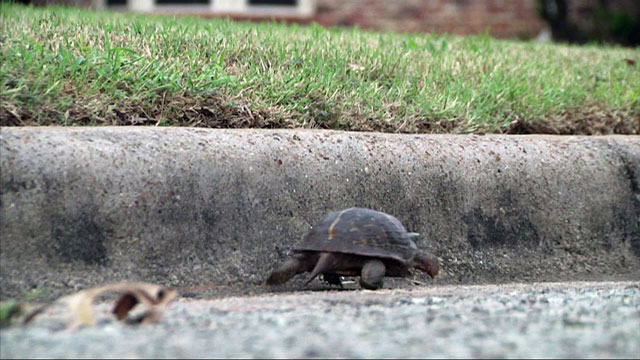The Guelph Humane Society is asking drivers to watch out for turtles this time of year and possibly lend a helping hand.

The reptiles are in the midst of their egg-laying season until July and will often lay their eggs in the sandy, gravel shoulders along the road, the Humane Society said in a news release on Tuesday.
“While crossing the roadways they are at significant risk of injuries or death due to collision with vehicles,” the news release stated. “There are eight native species of turtles in Ontario, and all are designated as either endangered, threatened, or of special concern.”
“Road mortality is second only to habitat loss, as a contributing factor to declining populations.”
The Humane Society said they have received a number of calls over the last week about turtles in need of assistance and they are asking drivers to stop and give turtles a hand crossing the road, if it is safe to do so.

Get breaking National news
They stressed that turtles should always be moved in the direction that they are headed.
“For species other than snapping turtles, you can pick up the turtle with two hands, one on either side of the shell, and carefully transport them across the road,” the Humane Society said.
If it is a snapping turtle, the Humane Society recommends approaching from behind and firmly gripping the turtle at the rear of their shell, and sliding them onto a car mat or shovel.
“You can then slide them across the road, continuing to hold them by the back of their shell, until they are safely across,” the Humane Society said.
“Never approach a snapping turtle from the front or side of the shell, as they have a long neck that can reach out and around their shell and potentially deliver a nasty bite.”
Never pick up a turtle by the tail, as it can cause a serious injury to their spinal column, the Humane Society said.
Turtle rescuers should then disinfect their hands afterwards, as turtles can carry salmonella.
“Helping turtles on roadways isn’t just a compassionate gesture,” says Lisa Veit, associate director of the Humane Society.
“It is also extremely important to the conservation of our native turtle species.”
Residents should contact the Humane Society if a turtle has been injured or if a dead turtle is found along the roadway so any eggs can be collected, incubated and hatched by wildlife officials.
Injured turtles should be removed from the road and secured in a box or plastic tote.
“Even when injuries seem extremely grave, turtles are incredibly robust and capable of recovering from extensive trauma to their shell when provided with the necessary medical care,” the Humane Society said.
More information on identifying turtle species and additional resources can be found on the Ontario Turtle Conservation Centre’s website.
- Federal government raises concerns over OpenAI safety measures after B.C. tragedy
- Free room and board? 60% of Canadian parents to offer it during post-secondary
- Ipsos poll suggests Canada more united than in 2019, despite Alberta tensions
- Indigenous leaders outline priorities for spring sitting of Parliament








Comments
Want to discuss? Please read our Commenting Policy first.